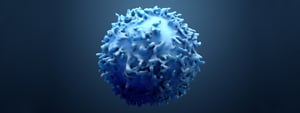The symptoms of Covid-19 sufferers cover a very wide range between two extremes, from a total absence of any signs of the disease to death, passing through various forms of mild respiratory difficulties, but also pneumonia, damage to the heart, kidneys, brain and colon, and even a cytokine storm (an exaggerated reaction of the immune system, which can be fatal). What does this extreme variety of possible damage, but always due to the same virus, depend on? An attempt is being made to understand this, and researchers from the University of Pennsylvania think they have identified a general cause: there appears to be at least three different immunological profiles (or three “settings” of our defensive system), which lead to different reactions to SARS-CoV-2 (the virus that causes the Covid-19 disease).
The researchers have come to this conclusion by analysing the blood of 125 patients and cataloguing their immune systems into three large groups. As the journals Science and, with the details, Science Immunology report, about one third of patients shows an activation of their T lymphocytes (fundamental cells of the immune system), which is typical of acute viral infections. Another third presents, instead, a lymphocyte profile which is superimposable on that of subjects who have no active viral infection. Lastly, the remaining patients present intermediate situations. Each of these three categories of patients behaves differently when they encounter the virus and, for this reason, it is important to identify immediately to which “immune group” each patient belongs, in order to define, in advance, the risks they face and decide on treatment.
The different kinds of activation of T lymphocytes also help to explain why some people do not develop antibodies (produced by B lymphocytes), or they develop very few, even though they have been infected with SARS-CoV-2. In those patients, the T lymphocytes directly identify and eliminate (or try to eliminate) the cells affected by the virus, without any need for antibodies. Alessandro Sette, a professor at La Jolla Institute’s “Infectious Disease and Vaccine Center”, in California, confirmed to the Reuters news agency that there is growing evidence that in people exposed to the virus there is a transient, short-lived production of antibodies and, at the same time, a T-lymphocyte response. Indeed, there are growing doubts among researchers that the production of antibodies to combat coronavirus is solid and long-lasting. This could mean, as we said, that T lymphocytes play a more important role in providing protection against this disease.
A recent small-scale French study showed, for example, that six out of eight members of a family who had remained close to relatives with Covid-19 developed a T lymphocyte response, but they did not test positive for antibodies.
Even in the context of a larger Swedish study (conducted on 200 people with mild symptoms, or no symptoms at all, after coronavirus infection), the researchers measured in most cases a strong presence of T lymphocytes, regardless of whether an antibody response had also appeared. Based on these results, the researchers suggest that the percentage of people infected with coronavirus worldwide could be higher than what has been calculated based on the antibody tests only.

